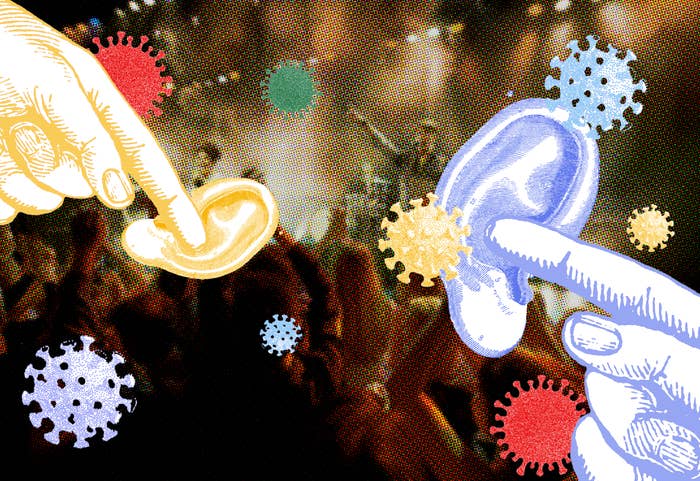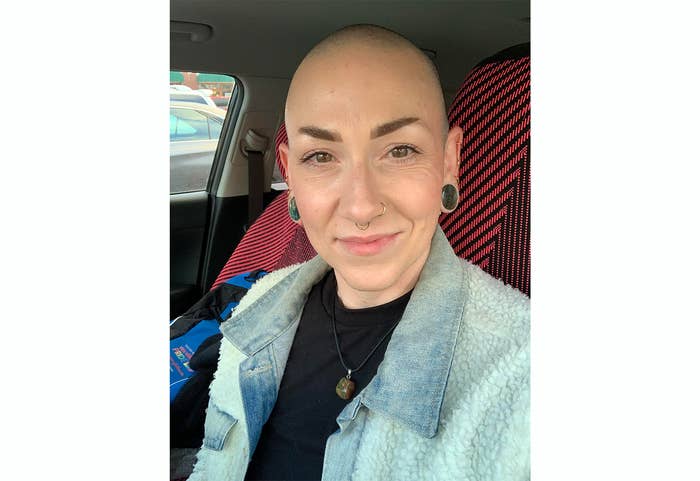
Grey Rye didn’t notice their hearing loss until one summer day last year when they were performing a facial on a client who was chatting about the upcoming holidays. The 38-year-old esthetician was desperately trying to read the client’s lips instead of focusing on what their hands were doing.
“That’s when I first really realized, OK, this is a problem, and I need to take care of it,” Rye told BuzzFeed News.
Their first COVID infection in February 2022 was a mild coldlike illness that left them with tinnitus, or ringing, in both ears. Six months later, Rye tested positive again. They were bedridden for three days with severe muscle aches and full-body fatigue, and their chronic tinnitus got worse.
It wasn’t until a few weeks after recovering from COVID a second time that Rye noticed their left ear wasn’t picking up sounds like it used to. TV captions became a must, as well as earplugs in public to help subdue ambient noises so they could hear what others were saying.
“Everything sounds like clanging metal, almost like it’s attacking my senses,” Rye said. “If I don’t wear earplugs, I get sensorily overwhelmed because my brain is trying to process everything, and it can’t because I can’t hear.”
“It's just wild to me, and there's nothing else going on in my life that would cause this to happen,” Rye added. In fact, there’s an entire community of people who are experiencing the same thing — post-COVID hearing loss that doesn’t seem to have any other obvious cause.

Since the pandemic began, several studies have found a connection between coronavirus infection and sudden sensorineural hearing loss, or SSHL: the rapid and often unexplained loss of hearing in one or both ears. It can happen all at once or over a few days, and it’s usually accompanied by other symptoms like dizziness and tinnitus.
People with SSHL tend to feel like one ear is blocked, congested, or clogged. This happens because something, in this case the coronavirus (either directly or indirectly) damages the cochlear nerve, which is the sensory nerve responsible for transferring auditory information from the inner ear to the brain.
The first case linking COVID and hearing loss was reported in April 2020, three months after the coronavirus was officially detected in the US.
Hearing loss is just one of the many lingering symptoms that debilitates people with long COVID for weeks, months, or even years after infection. Memory loss, sensitivity to light, loss of smell and taste, and brain fog are other common neurologic symptoms that persist among people with post-COVID conditions.
Like other long COVID symptoms, hearing loss can have an immense impact on quality of life, affecting relationships, safety, sleep, concentration, energy levels, and more. Hearing loss is also strongly associated with cognitive decline over time, contributing to worsening memory and thinking skills.
There’s no definitive proof that COVID is robbing people of their hearing, but based on what researchers know about other viruses’ effects on the auditory system, it’s not an unreasonable connection to make, according to Dr. Courtney Voelker, a head and neck surgeon at Pacific Neuroscience Institute in California who treats adults and children dealing with conditions of the inner ear and skull.
“I'm surprised at the gravitas of this virus in that it can integrate into all these different body systems,” Voelker said, “but as far as a virus is concerned, there is a track record of other viruses that can cause hearing loss,” including but not limited to hepatitis, HIV, rubella, influenza, mumps, herpes, and measles.
“There's no way I can prove that it's COVID, but the more people that started to come in after the lockdown, the more my community of subspecialists started talking amongst ourselves,” Voelker said. “Obviously not all people that get COVID have hearing loss, but the relationship just can’t be ignored.”
Yet, three years later, people grappling with hearing loss post COVID still don’t have clear answers or treatment options and continue to face doctors who dismiss their concerns.
After looking into Rye’s ears and nose, doctors told them there was nothing they could do to address their tinnitus or hearing loss, and dismissed their symptoms as “getting older.” Rye was advised to take anti-inflammatories. Luckily, they were able to find a doctor who listened and helped schedule a hearing test, but now they have to travel nearly two hours to see their healthcare provider.
Living in a “very red part of California” and being transgender doesn’t help. “I have a lot of things stacked up against me when I go to the doctor, so even in the medical field a lot of people have been dismissive of the effects of COVID,” said Rye, who’s also dealing with sudden loss of balance, dizziness, rapid heartbeat, and worsening vision. “I'm just trying to take control of what's going on with my body because I don't want to end up completely deaf or fully hard of hearing.”
Why might COVID cause hearing loss?
The most plausible, albeit unconfirmed, theory to explain COVID-related hearing loss is that the coronavirus directly infects the inner ear, which is critical for hearing and balance.
A 2021 study published in the Nature journal Communications Medicine showed that hair cells in the inner ear have the ability to express the proteins that the coronavirus needs to infect them.
The researchers speculate that the virus may access the ears through the Eustachian tube, which connects the back of the throat to the middle ear. It’s also possible that the virus travels from nasal passages via openings around olfactory nerves and enters the brain space. From there, it may infect nerves that connect to the inner ear.
Another theory is that the coronavirus causes an inflammation cascade that damages the inner ear hair cells, Voelker said. And because of mounting evidence that shows COVID can cause abnormal blood clotting, leaky vessels, and reduced blood flow, Voeker said it’s possible that the “delicate blood vessels that run to the inner ear” are sabotaged in a way that causes hearing loss.
The biggest misconception, however, is that COVID-related hearing loss is due to congestion, according to Voelker, who said she “hates that explanation.”
BuzzFeed News spoke to one of Voelker’s patients, Lisa Mecham, whose first doctor blamed her hearing loss on congestion, cleaned her ears out in case there was wax buildup, and said “it will go away with time.”
It didn’t. About a week later, Mecham, 51, still had hearing loss in both ears, although her left one was much worse. She also had (and still has) tinnitus that sounded like a truck revving its engine or a high-pitched ringing, which has made loud noises painful to bear.
“It was the kind of thing where I’m like, This doesn’t feel like congestion. It’s like a muffling, like someone stuck a cotton ball into your ears. The things you hear about people who have hearing loss all of a sudden, I was like, Wow, this is happening to me,” Mecham, a writer in California, told BuzzFeed News. “You do feel like you’re gaslighting yourself. Like is this really what I think it is or is it just congestion?”
Of course, congestion can affect your hearing — anyone who’s had a bad cold could attest to that. This happens because congestion causes a buildup of pressure and fluid in the ear that blocks sound waves from flowing freely; it’s temporary and usually resolves on its own or with help from a doctor.
But this mechanism differs from that of actual damage to sensory nerves in the ear, Voelker said, which is likely what’s going on with post-COVID hearing loss.
A handful of early studies suggested that COVID vaccines might cause hearing loss in some people, but researchers were able to show in follow-up research that wasn’t the case. (In fact, vaccination may help prevent hearing loss by reducing the risk of infection.)
Meanwhile, more than 600 medications are known to be ototoxic, meaning they can damage hearing: pain relievers like Tylenol and Advil, specific antibiotics, diuretics to treat high blood pressure, some chemotherapy drugs, hormone therapies to treat menopause, and drugs for malaria and lupus, such as chloroquine and hydroxychloroquine, which were used as COVID treatments early in the pandemic.
Remdesivir, an FDA-approved medication for the treatment of COVID in children and adults, has been associated with ototoxic effects. But the role that this drug and others have in causing hearing loss as it relates to COVID has not been investigated.
The good news is that most of the ototoxic effects of these medications are temporary and resolve once use stops.
How common is hearing loss after COVID?
Hearing loss is one of the most undiagnosed conditions in the US, according to Voelker, who said that many people won’t notice their diminished hearing until it worsens dramatically years later — all to say it’s incredibly difficult to quantify how common of a post-COVID symptom it is.
It also doesn’t help that the limited studies on the subject, often with small sample sizes, are based mostly on COVID patients who went to a hospital, excluding a large subset of people who didn’t have to or couldn’t.
What’s clear at this point in the pandemic is that hearing loss after COVID mostly affects adults. No cases among children have been documented in a published study or case report, although that doesn't mean kids aren't experiencing this issue.
One study of 28 hospitalized COVID patients in India who all reported problems with their hearing found that 24 of them had sensorineural hearing loss and the other four had conductive hearing loss, which is when fluid, tissue, or bony growths block or reduce incoming sounds. The majority of patients lost hearing in one ear.
Of 225 people with COVID who developed loss of smell and taste in Denmark, more than 10% reported hearing loss and 16% reported tinnitus, an observational study published in 2022 found. And in one city in Turkey, researchers found that more people experiencing hearing loss visited otolaryngology clinics in the first year of the pandemic compared to the same period the year prior; 60% of the patients had active or recent COVID symptoms.
So while there's compelling evidence that points to COVID's association with hearing loss, studies haven’t been conclusive. A review of 26 global case reports and studies (involving only a total of 23 patients) on COVID and hearing loss concluded that research findings “were inconsistent and even contradictory.”
Dr. Robert Sataloff, professor and chair of the department of otolaryngology at Drexel University College of Medicine, said that hearing loss is a well-known consequence of COVID, in addition to tinnitus, dizziness, facial paralysis, and dysphonia (difficulty speaking) — likely due to nerve damage in the ears. But he said there’s no evidence that loss of hearing is more common with long COVID.
“The fact that hearing impairment and/or tinnitus occur at the time of the COVID infection does not necessarily mean that they were caused by the COVID infection,” Sataloff wrote in an email. “Unfortunately, it is common to make the mistake of assuming that the temporal relationship establishes causation. It does not. That is a post hoc, ergo hoc flaw in logic.”
Still, correlation between COVID infections and timing of hearing loss onset “certainly line up,” Voelker said.
Early treatment is critical for people with post-COVID hearing loss
When it comes to SSHL, early treatment is key because “generally speaking, once it's out, it's out,” Voelker said. “Sometimes, no matter what we do, we can’t get that hearing back, even if people come in right away, but the sooner we can implement a steroid regimen, the better the chance that we can save it.”
Whatever damage is being done in the ear, the worst of it occurs early on in an infection. Targeting that destruction as soon as possible “can calm down all the downstream effects,” Voelker said.
But that’s easier said than done. Many people might notice their hearing loss after treatments like steroids may be effective. Sometimes, hearing loss becomes apparent months after infection, at which point they may already have irreversible damage. (One of Voelker’s older patients with hearing loss after COVID lost their hearing in both ears, which is rare, and needed a cochlear implant.)
Mecham luckily went under Voelker’s care just in time to qualify for steroid treatment. A regimen of oral steroids — the first treatment option for people with SSHL — didn’t help, so Voelker administered a steroid injection directly into her ear.
“It’s a very weird feeling, I got incredibly dizzy, and I thought I was going to throw up for the first few seconds,” Mecham said. “It’s not fun, but I wish I had done it earlier.” Within four days, Mecham noticed her hearing had improved. A second shot gave her the most relief and improvement.
Mecham’s hearing in her left ear is now about 80% of what it used to be, and tinnitus still affects her every day. While it’s possible her hearing may never fully recover, she said she’s hopeful an app called AudioCardio, which she’s been using every day, will bring some relief to her tinnitus. The app delivers inaudible sound to your ears in an effort to stimulate cell growth and stop tinnitus.
Studies show that the majority of people who have hearing loss after COVID only recover partially and many don’t experience any improvement. But Voelker said there are still some options people can pursue to regain some of their hearing, such as hearing aids, which are the recommended treatment once all other options have been exhausted.
You should still get your hearing tested, though, Voelker said, no matter how long it’s been after your bout with COVID.
“There's still so much we're learning about COVID and its ramifications,” Voelker said. “It's never too late to get a hearing test and be assessed so we can see how to help you.”
